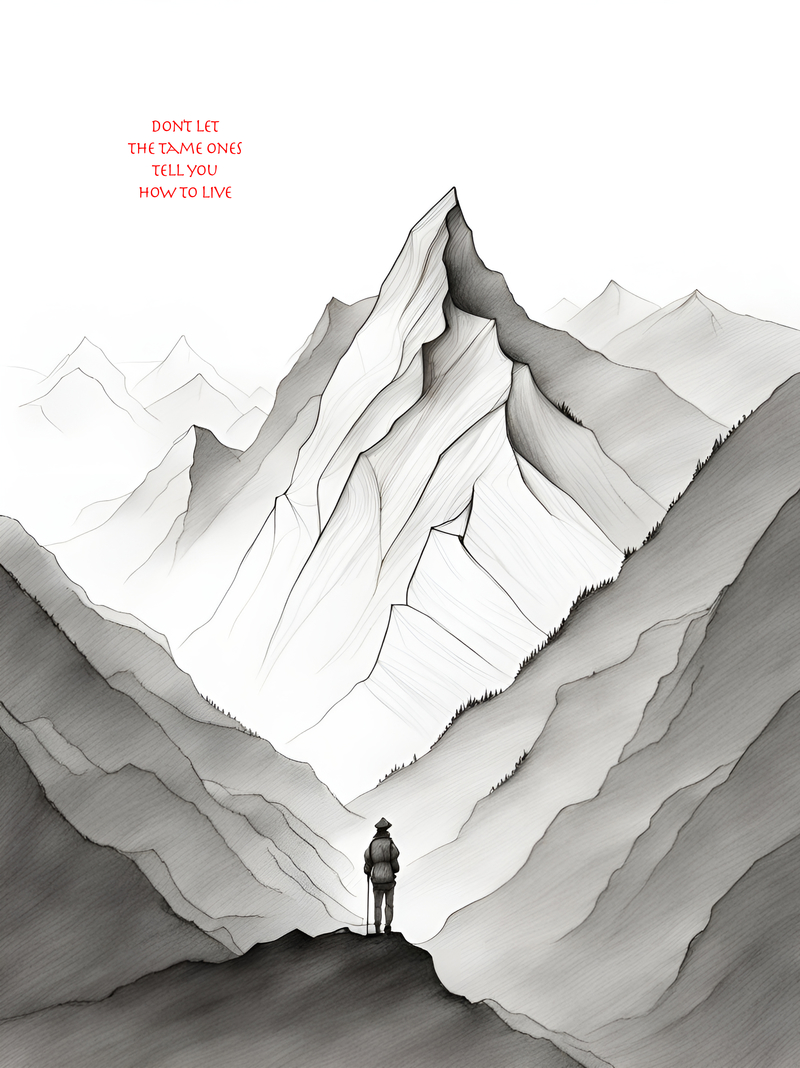Excerpt: The following recounts the life and story of Buddha and how he went from being a young, spoiled child to the sage we remember him as today.
The following is an excerpt from The Subtle Art of Not Giving a F*ck by Mark Manson. It recounts the life and story of Buddha and how he went from being a young, spoiled child—who had essentially everything (and anything) he could have ever wished for—to the sage that we remember him as today who practiced severe asceticism before his enlightenment.
The suffering that the Buddha endured formulated the foundation for the teachings and philosophies on which Buddhism was later founded and the story of the Buddha shares a deep insight about how happiness is not the absence of suffering but rather a dance with suffering and non-ascetic, middle way living.
Below, you will find the story of Buddha as it was shared in The Subtle Art of Not Giving a F*ck. While you read, we strongly encourage you to reflect on your beliefs of suffering and happiness and challenge you to take notes (real or mental) on areas of your life that might need some attention or reevaluation.
Some questions to consider: Are you pursuing happiness or happy in your pursuits? Are you waiting for a criteria to be met before you feel that you can be happy? Is meeting that criteria really going to make you happy or will it just lead to more criteria? We hope this helps and we hope you find value in this story.
NEW In The Shop: Don’t Let The Tame Ones Tell You How To Live [Poster]
Why We ♥ It: Some of the best advice I (Matt here) ever got was: don’t take life advice from people who aren’t living a life you want to live and don’t take criticism from people you wouldn’t go to for advice. I created this poster to act as a reminder to listen more closely to our role models and less closely to our critics, trolls, and tamed-comfort-zone-hugger acquaintances. It’s also a perfect gift for the outdoor adventurer, travel enthusiast, or solo explorer (or soon to be). Available in print or digital download. 👇🏼
...Want to advertise your book, product, or service? Send inquiries to matt@movemequotes.com.
The Story of Buddha:
About twenty-five hundred years ago, in the Himalayan foothills of present-day Nepal, there lived in a great palace a king who was going to have a son. For this son the king had a particularly grand idea: he would make the child’s life perfect. The child would never know a moment of suffering—every need, every desire, would be accounted for at all times.
The king built high walls around the palace that prevented the prince from knowing the outside world. He spoiled the child, lavishing him with food and gifts, surrounding him with servants who catered to his every whim. And just as planned, the child grew up ignorant of the routine cruelties of human existence.
All of the prince’s childhood went on like this. But despite the endless luxury and opulence, the prince became kind of a pissed-off young man. Soon, every experience felt empty and valueless. The problem was that no matter what his father gave him, it never seemed enough, never meant anything.
So late one night, the prince snuck out of the palace to see what was beyond its walls. He had a servant drive him through the local village, and what he saw horrified him.
For the first time in his life, the prince saw human suffering. He saw sick people, old people, homeless people, people in pain, even people dying.
The prince returned to the palace and found himself in a sort of existential crisis. Not knowing how to process what he’d seen, he got all emo about everything and complained a lot. And, as is so typical of young men, the prince ended up blaming his father for the very things his father had tried to do for him. It was the riches, the prince thought, that had made him so miserable, that had made life seem so meaningless. He decided to run away.
But the prince was more like his father than he knew. He had grand ideas too. He wouldn’t just run away; he would give up his royalty, his family, and all of his possessions and live in the streets, sleeping in dirt like an animal. There he would starve himself, torture himself, and beg for scraps of food from strangers for the rest of his life.
The next night, the prince snuck out of the palace again, this time never to return. For years he lived as a bum, a discarded and forgotten remnant of society. And as planned, the prince suffered greatly. He suffered through disease, hunger, pain, loneliness, and decay. He confronted the brink of death itself, often limited to eating a single nut each day.
A few years went by. Then a few more. And then… nothing happened. The prince began to notice that his life of suffering wasn’t all that it was cracked up to be. It wasn’t bringing him the insight that he had desired. It wasn’t revealing any deeper mystery of the world or its ultimate purpose.
In fact, the prince came to know what the rest of us have always kind of known: that suffering totally sucks. And it’s not necessarily that meaningful either. As with being rich, there is no value in suffering when it’s done without purpose. And soon the prince came to the conclusion that his grand idea, like his father’s, was in fact a terrible idea and he should probably go do something else instead.
Totally confused, the prince cleaned himself up and went and found a big tree near a river. He decided that he would sit under that tree and not get up until he came up with another grand idea.
As the legend goes, the confused prince sat under that tree for forty-nine days. We won’t delve into the biological viability of sitting in the same spot for forty-nine days, but let’s just say that in that time the prince came to a number of profound realizations.
One of those realizations was this: that life itself is a form of suffering. The rich suffer because of their riches. The poor suffer because of their poverty. People without a family suffer because they have no family. People with a family suffer because of their family. People who pursue worldly pleasures suffer because of their worldly pleasures. People who abstain from worldly pleasures suffer because of their abstention.
This isn’t to say that all suffering is equal. Some suffering is certainly more painful than other suffering. But we all must suffer nonetheless.
Years later, the prince would build his own philosophy and share it with the world, and this would be its first and central tenet: that pain and loss are inevitable and we should let go of trying to resist them. The prince would later become known as the Buddha. And in case you haven’t heard of him, he was kind of a big deal.
There is a premise that underlies a lot of our assumptions and beliefs. The premise is that happiness is algorithmic, that it can be worked for and earned and achieved as if it were getting accepted to law school or building a really complicated Lego set. If I achieve X, then I can be happy. If I look like Y, then I can be happy. If I can be with a person like Z, then I can be happy.
This premise, though, is the problem. Happiness is not a solvable equation. Dissatisfaction and unease are inherent parts of human nature and are necessary components to creating consistent happiness.
If you enjoyed the story of Buddha and want to read more, you can find more quotes, resources, and info from Mark Manson’s book below:
Book Overview: In this generation-defining self-help guide, a superstar blogger cuts through the crap to show us how to stop trying to be “positive” all the time so that we can truly become better, happier people. For decades, we’ve been told that positive thinking is the key to a happy, rich life. “F**k positivity,” Mark Manson says. “Let’s be honest, shit is f**ked and we have to live with it.” In his wildly popular Internet blog, Manson doesn’t sugarcoat or equivocate. He tells it like it is—a dose of raw, refreshing, honest truth that is sorely lacking today. The Subtle Art of Not Giving a F**k is his antidote to the coddling, let’s-all-feel-good mindset that has infected modern society and spoiled a generation, rewarding them with gold medals just for showing up.
Buy from Amazon! Listen on Audible!
Great on Kindle. Great Experience. Great Value. The Kindle edition of this book comes highly recommended on Amazon.
Read Next:
NEW In The Shop: Don’t Let The Tame Ones Tell You How To Live [Poster]
Why We ♥ It: Some of the best advice I (Matt here) ever got was: don’t take life advice from people who aren’t living a life you want to live and don’t take criticism from people you wouldn’t go to for advice. I created this poster to act as a reminder to listen more closely to our role models and less closely to our critics, trolls, and tamed-comfort-zone-hugger acquaintances. It’s also a perfect gift for the outdoor adventurer, travel enthusiast, or solo explorer (or soon to be). Available in print or digital download. 👇🏼
...Want to advertise your book, product, or service? Send inquiries to matt@movemequotes.com.

Written by Matt Hogan
Founder of MoveMe Quotes. On a mission to help busy people do inner work—for better mental health; for healing; for personal growth. Find me on Twitter / IG / Medium. I also share daily insights here. 🌱
It has taken me 1,000’s of hours to build this free library for you. If it has helped you, you can support my continued effort here. ☕️
![The Story of Buddha and How Happiness is Not the Absence of Suffering [Excerpt]](https://movemequotes.com/wp-content/uploads/2017/02/IMG_0487-930x620.jpg)


![The Story of Buddha and How Happiness is Not the Absence of Suffering [Excerpt]](https://movemequotes.com/wp-content/uploads/2017/02/IMG_0487.jpg)
![Buddhism: The Four Noble Truths [Excerpt]](https://movemequotes.com/wp-content/uploads/2014/06/IMG_5850.jpg)
![Buddha: On Getting Insulted [Excerpt]](https://movemequotes.com/wp-content/uploads/2014/01/Buddha.jpeg)